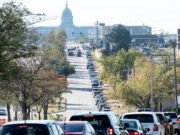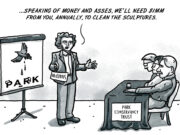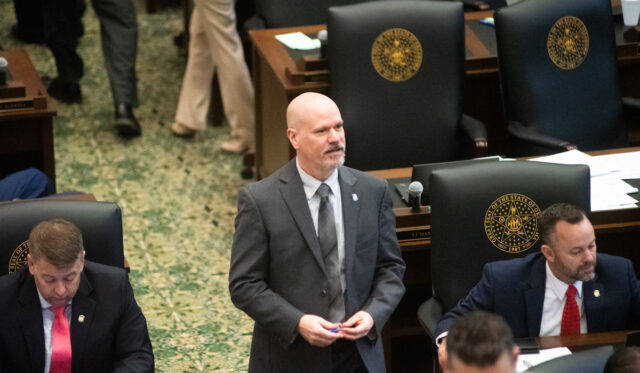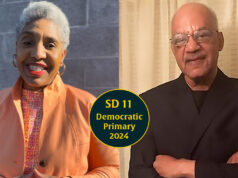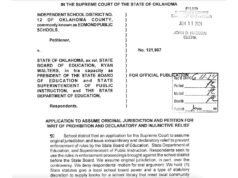As the Oklahoma Legislature negotiates the Fiscal Year 2025 budget, a number of policy bills are currently sitting on various rungs of the long legislative ladder, including two aimed at expanding religious options for kids in public schools.
The two bills, Senate Bill 36 and House Bill 1425, respectively would allow districts to hire volunteer chaplains as school counselors and define how students can receive off-campus bible instruction during school hours.
While opponents denounced previous versions of the bills as additional efforts to insert religion, namely Christianity, into public schools, supporters have said they simply expand instructional options for students if school districts choose to allow them.
“It’s not really about necessarily inserting religion, but just having a firm foundation that these kids (and) staff could use,” said Rep. Kevin West (R-Moore), who introduced the chaplain bill.
Sen. Carri Hicks (D-OKC), a former teacher who serves on the Senate Education Committee, said the bills do not address the needs of Oklahoma’s education system.
“Everyone, specifically in the business community, is asking for better. We want kids to be ready to enter the workforce,” Hicks said. “These two proposals — I don’t see that that is an actual solution to the challenges that we’re facing in education currently.”
Both bills began the legislative process as something else entirely before they were amended to their current versions when they reached their opposite chambers.
SB 36 began as a holdover bill from last year dealing with the Open Records Act. It passed off the Senate floor in March 2023 but did not receive a hearing in the House.
This year, West granted the bill a hearing in the House General Government Committee that he chairs. But during an April 9 meeting, West substituted the bill text with language that would authorize school districts to hire chaplains as counselors.
In its current version, SB 36 would allow school districts to hire volunteer chaplains of any faith who meet certain requirements as school counselors. If a school district chooses to hire a chaplain, the person must pass a background check. Chaplains would be prohibited from “attempting to convert someone from one religion, belief, or opinion to another,” and parents would have the option to opt their student out of receiving services from the chaplain.
The committee substitution drew concern from House Minority Leader Cyndi Munson (D-OKC) who argued that bill substitutions had to be germane to the original bill’s subject. Despite the bill going from a Title 51 measure to a Title 70 proposal, West said that, as chairman, he was allowed to determine the amendment’s germaneness.
“General Government (Committee) is general government, which, generally speaking, everything that we do up here is government. So I get her point, and her point’s well taken that it didn’t go through the Education Committee,” West said May 15 of Munson’s objection. “That wasn’t really by design. It was a vehicle that was available. It was still heard by the entire body on the House floor, so everybody had a had an opportunity to weigh in on that.”
West also said he accepted some Democratic amendments to the bill after it passed out of committee, namely the clause that prohibits the chaplains from proselytizing as they perform their school counselor duties.
SB 36’s chaplain proposal pushed by national group
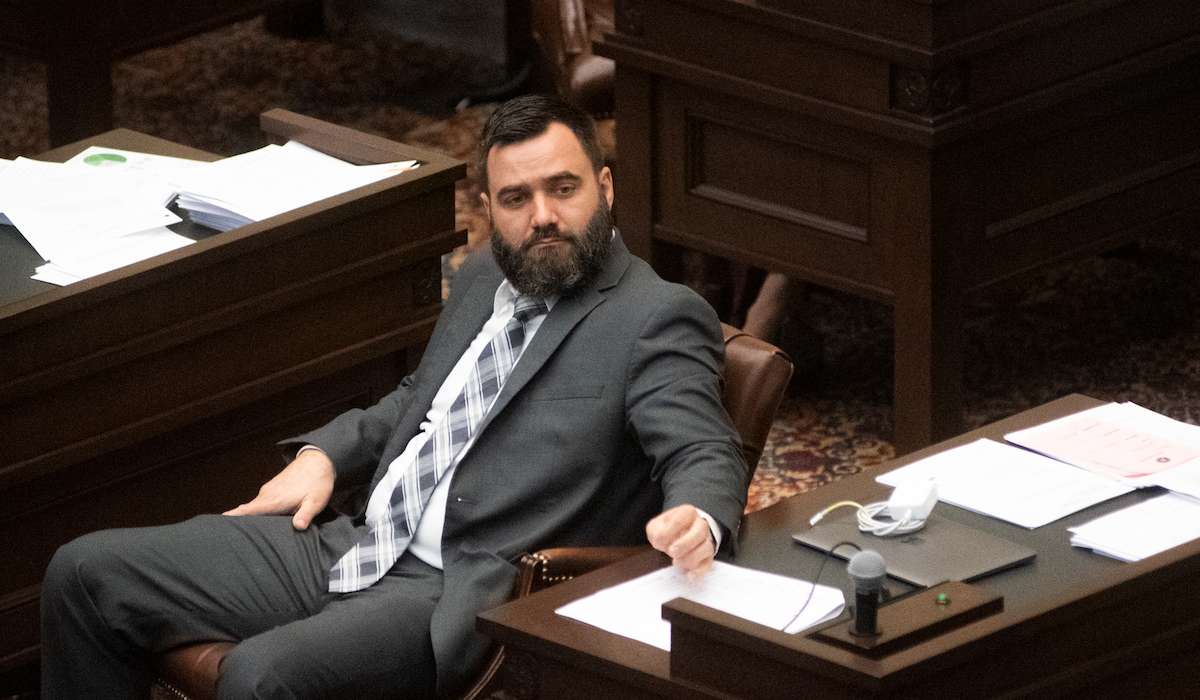
The addition of those amendments means SB 36 is more narrow than the Texas bill after which it was modeled. That bill passed the Texas Legislature and became law with Gov. Greg Abbot’s signature June 18, 2023. It took effect in September.
“What came through committee was modeled after the Texas language,” West said. “In my opinion, it was way too broad, but we were at deadline week, so I wanted to get something.”
As Texas lawmakers debated the bill last year and rejected a number of amendments similar to those approved by the Oklahoma House, reporting at the time from the Texas Tribune showed the Texas bill and related bills across the country were being pushed by the National School Chaplains Association, an organizations that calls itself a Texas nonprofit on its website but which lists its address on tax forms as a post office box in Norman. (The organization also goes by the moniker Mission Generation, and its registration with the Oklahoma Secretary of State’s Office lists it as a foreign not-for-profit corporation founded in Texas in 2015.)
The NSCA, which recently posted on social media about Oklahoma’s bill, is run by Rocky Malloy, a former South American missionary who has promoted using public school systems to evangelize to students.
“We realized that the largest network in any country was the school system,” Malloy said in an interview with Risen Magazine, a Christian publication.
Malloy also promoted school chaplains in another interview as a way to push back against secularism and transgender rights.
West said he worked with the NSCA and other groups to support the bill.
“I have talked to them,” West said of NSCA. “They’re not the ones that had initiated this.”
West said NSCA leaders were not thrilled with a part of the bill that requires chaplains to hold a masters-equivalent level of education.
“They probably would have preferred that part not be in, but they said it doesn’t hurt it,” West said. “It limits your your field but certainly doesn’t hurt the overall effort.”
The amendment means that some people who go through the NSCA’s $1,500, eight-week chaplain certification course might not be eligible if the bill becomes law as is. Hicks said the fact NSCA even offers that course in the first place made her curious about the group’s motivation.
“It felt very much like a money grab,” Hicks said. “They’re trying to expand the school chaplaincy program so that they can expedite the [eight] week training course and push folks into the classroom.”
West’s bill gained notoriety recently after The Satanic Temple, an organization that promotes secular virtues and values, announced that it plans to take advantage of the program with its own chaplains. The announcement prompted State Superintendent of Public Instruction Ryan Walters, who has been supportive of the chaplain bill, to tell the group to “go to hell.”
But West said the qualifications in his bill, such as one that requires chaplains to have an “ecclesiastical endorsement,” would prevent groups like TST from placing their chaplains in schools.
West said he believes the bill is important to address growing mental health challenges for public school students and teachers.
“Teachers have a very similar level of PTSD as first responders do because these kids trust these teachers, and they’re hearing a lot of this stuff,” West said. “There’s things that [kids are] dealing with today that weren’t even really thought about. (…) These are people who are specifically trained to help deal with some of those situations.”
Overall, the numerous clauses narrowing the scope of the bill and the fact that the bill allows but does not require a school chaplain program seem to have made it easier for some Republican lawmakers to swallow.
“I’m happy that it’s got the local control piece that each individual school district would vote whether or not they would want to do this, but I do have my reservations.” said Rep. Mark McBride (R-Moore).
McBride, who chairs the House Appropriations and Budget Subcommittee on Education, said his own experience with a tornado devastating his hometown of Moore in 2013 showed him that mental health care is important.
“We needed every kind of counselor we could get,” McBride said. “I just think we’ve got to be real careful in what that looks like going forward. [The Satanic Temple] is a concern of mine.”
Treat: ‘I don’t know anything about’ SB 36
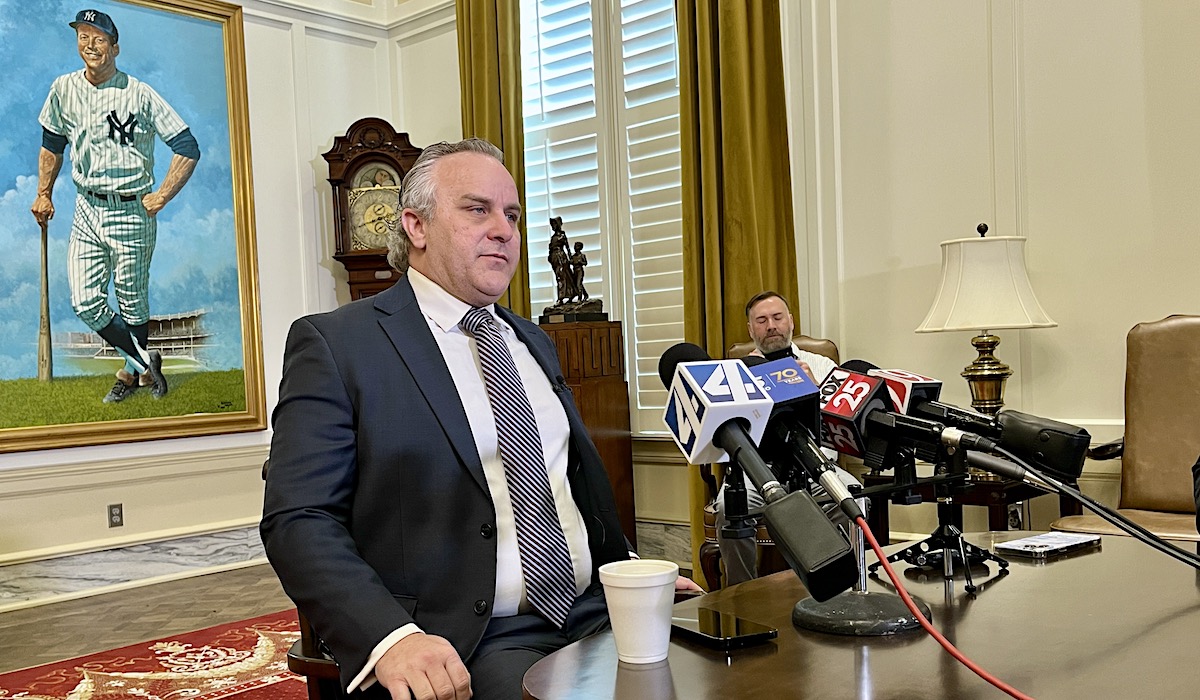
But despite the efforts made to make the bill more palatable, its fate in the Senate is unclear.
Although the bill originated in the Senate, lawmakers in that chamber have yet to vote on the chaplain language because the bill’s original content dealt with the Open Records Act. If the House amendments are accepted, SB 36 would need only a Senate floor vote to advance to the governor. If the amendments are rejected, the bill could be assigned to a conference committee for further negotiation.
Sen. Nathan Dahm (R-Broken Arrow) is the Senate author of SB 36, but he did not respond to messages seeking comment on the proposal. As senators wait to see if Dahm accepts the House amendments to the bill, some do not seem to have given the matter much consideration owing to this year’s high-profile and contentious budget negotiations.
“I have no idea at this point,” said Senate President Pro Tempore Greg Treat (R-OKC) when asked about the bill’s potential fate. “I don’t know anything about it.”
Senate Education Committee Chairman Adam Pugh (R-Edmond) declined to comment on SB 36, noting that the language did not advance through his committee.
Other senators also said they were not familiar with the bill’s language but said they could be supportive of it.
“I’m open to chaplains being available if school districts choose to bring them in,” said Sen. Dewayne Pemberton (R-Muskogee). A retired educator, Pemberton sits on the Senate Education Committee.
Another Senate Education Committee member, Kristen Thompson shared a similar thought.
“It gives local school districts the opportunity to make the decisions that’s best for their students,” said Thompson (R-Edmond).
Fate of ‘released time course’ bill also uncertain
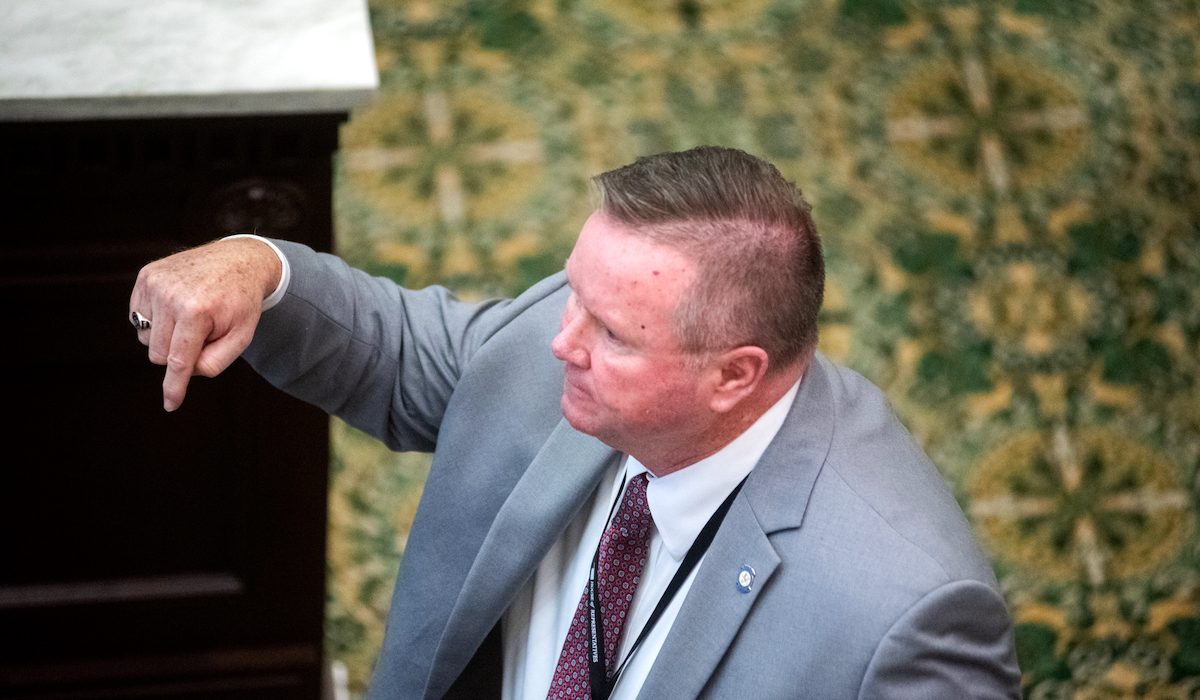
As the Senate figures out what to do with SB 36, the fate of another bill that has traveled a similar legislative path also remains unclear.
HB 1425 began in 2023 as a bill expanding teacher whistleblower protections to school support employees. After it passed the House with that language, Sen. Dave Rader (R-Tulsa) amended the bill in a Senate Education Committee meeting to reflect its current version.
As amended, HB 1425 uses language from a 1952 Supreme Court case to propose requiring districts to adopt a policy allowing public school students to attend off-campus “religious or moral instruction” courses. If the bill becomes law, it would put into statute that students can be released from classes for any subject on which they are not tested by the state to be bussed to another location up to three times per week for religious instruction. (Students could not be excused from classes on subjects like English, history, science and math.)
The bill would exempt school districts from all liability concerning the so-called “released time course,” and districts would also be prohibited from supporting the class in any way other than providing elective credit for it.
On the Senate floor, Rader said his proposal is meant to clarify that districts must comply with a provision of the Parents’ Bill of Rights that requires districts to excuse students for “religious purposes.”
“This bill will clarify the existing mandate. It gives the framework — it gives the guidelines by which a district can set this (policy),” Rader argued. “This will help eliminate some confusion. It will help the district set those parameters. It will help the parents understand just what it is that can be asked for their child to be involved in a program like this.”
Rep. Clay Staires (R-Skiatook) is the bill’s new House author. Staires said he plans to accept the Senate amendment to his bill for the same reasons Rader articulated when he proposed the amendment.
“I think this is a great bill for Oklahoma. It’s a great bill for parents. It’s an awesome bill for public schools,” Staires said. “How many parents are going man, ‘I love my public school. I don’t want to leave my public school, but I wish that we could have some piece in this of religious education.'”
The bill also seems to have the support of a national organization. LifeWise Academy, an Ohio-based nonprofit, has advocated for Oklahoma’s bill and similar bills in other states, and the group has offered to provide transportation services and Bible classes for students.
A recent NBC News article explained the leader of LifeWise’s goal to “inject the word of God into the hearts of the next generation.”
In response, the organization said its program improves school attendance and student behavior.
Staires, a former educator, said narratives around his proposal have ignored the fact that Supreme Court precedent allows students to attend religious courses off campus during school hours. While saying attention has been paid to the proposed requirement for districts to grant students “elective credit” for completion of an approved course, Staires argued that most students leaving campus for instruction would likely be elementary students.
He noted the bill’s requirement that local school boards establish rules for what courses qualify for elective credits
“Personally, I’m wondering how would that work,” Staires said. “I wouldn’t know how because that’s up to the local school board. What I’m saying I don’t know is I don’t know how the local school boards will determine the criteria for a credit. That’s up to them. But even if they don’t give a credit, schools can still do it.”
(Clarification: This article was updated at 9:05 a.m. Wednesday, May 22, to clarify information about HB 1425.)




